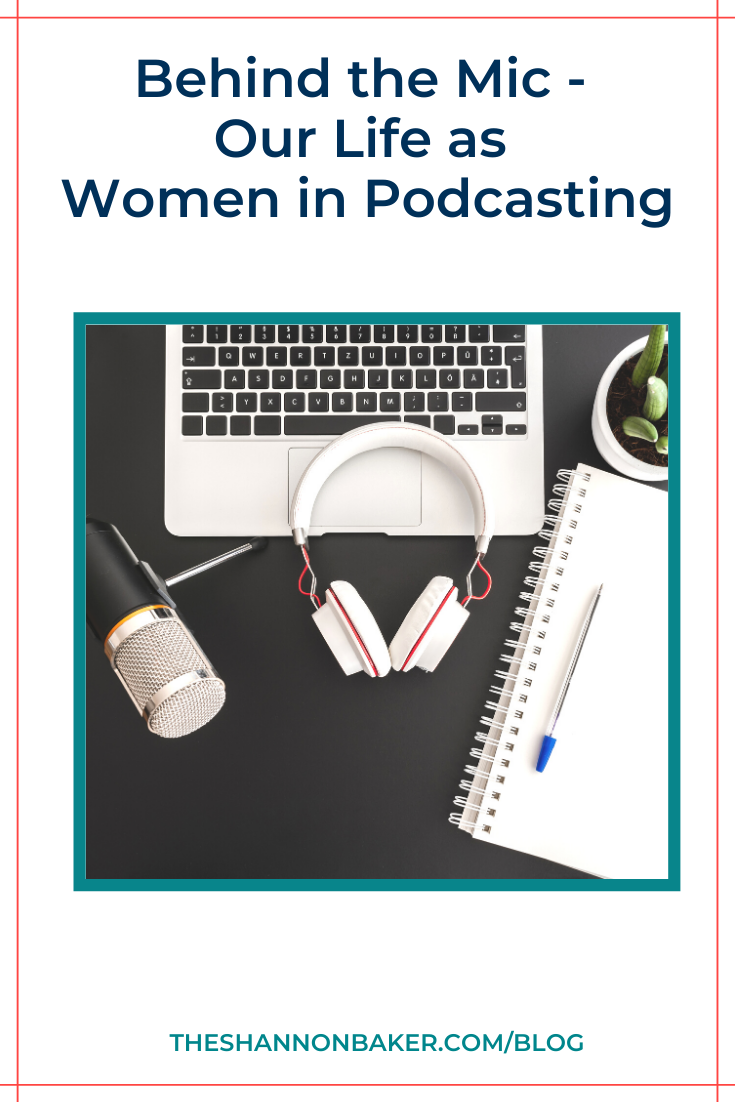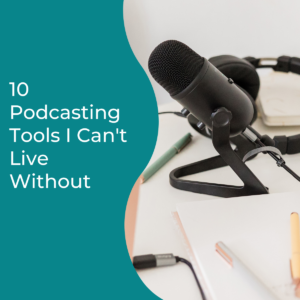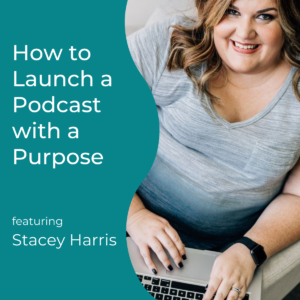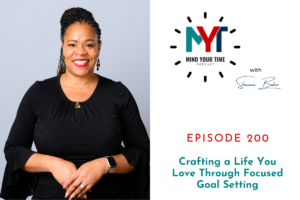The number of women in podcasting grows every day. Are you thinking about launching your own podcast?
I was invited to participate in a podcast panel discussion with a few of my podcasting besties and this post and my 50th podcast episode are going to give you some insight!
The women on the panel included myself, Allison Scholes (the organizer), Laura Shipman, Robin Graham and Elena Ciccotelli. The five of us have had on one heck of a podcasting journey so during our discussion we pull the curtain back on the podcasting world and talk about what it can do for you and your business.
About the Women in Podcasting on the Panel
I’m a business system strategist. In other words, I help busy women, especially mompreneurs create systems so that they can save time automating tasks, then they can focus on what matters most. My podcast is The More Than Capable Mompreneur. The episodes focus on the things that can be done in what I call the mom cracks of time, which are the little increments that we get as busy moms. But my episodes also help you to embrace that you are worthy of self-care, taking a step back, investing in your business. So the systems and the guests that I have on the podcast help with everyday things we deal with in addition to business things because in our world, they’re all one.
Allison Scholes is an Instagram Branding Coach who helps mompreneurs build their Instagram presence through coaching, creative copy and content.. Her podcast is called Social Media for Mompreneurs.
Lora Shipman is a social media manager, coach, strategist and podcaster. The Lora Shipman show is an educational podcast all about teaching people how to do social media effectively.
Robyn Graham helps female entrepreneurs by teaching them how to create personal brands that stand out, connect with their ideal audience and make money. Her podcast is The Second Phase Podcast and it’s all about brand and life strategies for success.
Elena Ciccotelli helps service based entrepreneurs build their online business by way of starting your business as a side gig. The Side Gig Central Podcast was she started as a side gig and that turned into a business. Her guests share all of their tips and knowledge and I do a couple o she does a few solo episodes just based on her real life experience.
Why did we start our podcasts?
I actually wanted to start a podcast like almost three years before I launched and I just launched in April 2020. But I knew I needed to be focused with my content but I didn’t have the clarity I wanted in my business. So once I took a step back from my business and really decided what I wanted to do, I had that clarity I needed.
I decided to use a podcast to establish myself as an expert in a new space. Everyone knew me as a virtual assistant but the podcast really is how I established myself in a new space.
Allison was a guest on a podcast before she even thought of starting one. Then the interest just unfolded. She thought she would just try it to expand and grow her audience. It really started as a passion project. She never thought it would be a huge part of her business.
Lora had a weekly segment on a local radio station on Saturday mornings and she loved that. When the radio station went under, she needed to find a way to fill that itch. So she kind of dipped her toe in the water a little bit on that radio show.
Robyn was a guest on several podcasts before she considered starting her own podcast. But she really enjoyed having those conversations and sharing her expertise and knowledge and helping other people grow. But public speaking causes her anxiety. Podcasting is kind of her way of overcoming that. The other reason was to be seen as that expert and authority in the personal branding and brand marketing strategy space.
She enjoys being able to interview people who are like her, in their second phase of their career, and have gone from phase one to phase two successfully and created solid businesses. Robyn is a storyteller by heart and just being able to tell those stories to inspire other people to overcome fear to take action, and stop procrastinating, that is why she started the podcast.
Elena is a content creator at heart. She works for a tech company out of Silicon Valley which is one of the things that drew her to podcasting. Having a podcast is away to be really visible and to build a brand new audience. A podcast would help her build a brand new audience, solidify her presence as a sales coach, as somebody that can actually help you get your your voice out into the world and actually make some sales.
Her podcast started as a side gig and she challenged herself to record an episode every single Monday. She released one episode for a year. It was an experiment just to like test and see if she could actually do it. She has built up an audience, built up a business. And she’s glad she decided to just start and just do it, even though she was insanely scared.
What opportunities have we received through podcasting?
I’ve had a couple of people ask me how am I getting speaking opportunities. Simply put, it’s because they listen to the podcast. I get invitations to speak at summits, which in turn, helps me develop relationships with not only the host, but the other speakers on the panel, and everyone that attends. That increases my website traffic and my email list has doubled.
I also get more clarity in my business and what services to provide because of the feedback that I get from the different episodes. And those moments when I have no idea what topic I want to cover in my next recording, I go back and look through the feedback, pick one and just roll with it because that’s what my audience wants.
Allison has met some incredible, talented people. There’s a relationship that you can build with people through podcasting, and you just never know what opportunities open. It may not always be like a sales opportunity but the referrals, that’s the biggest thing that I’ve gotten out of podcasting. I get a number of referrals and just random emails that I get with people who want to be on my show. I never need to go find people to be on my show.
Just when I get to the point that I’m getting down to the bottom of my list, I need to start brainstorming, and then all of a sudden, they just come flooding in. They want to be on my show and they already have the ideas, and it’s just awesome how it works out.
Lora was asked to be a keynote speaker. She’s been a featured speaker for a couple of different local peer groups. It’s been really good because she just tells people take a listen to these episodes. These are the ones she’ll probably speak to for their group. She will customize the information when she takes the stage.
Then in Florida, pre-COVID of course, there are a lot of convention sites. Lora enjoys doing the circuit and it’s usually over a weekend. It’s nice to spend the weekend at one of those resorts, because they usually put you up in one of these resorts. Then you get to meet all the people who you are speaking to interact with them and network with them. And it just opens up your networks so much more, which is a lot of fun for her.
Robyn has met many incredible people and enjoys building relationships. It’s been a confidence booster at the same time because people feel her podcast is worthy and they want to share their message on it. Then the speaking opportunities are just growth from a referral perspective. One of the reasons she started the show was to really be seen as the expert and authority in her space. And it has done that for her!
Everything comes in waves, but the opportunities have been consistent all year long. And the stages and the opportunities just keep getting bigger, the more content that she puts out, and she meets more people through interviews. People also join her Facebook group, or they’ll connect withher on Instagram and they’ll say, “Hey, I heard you on such and such.” And so it’s just, it’s a great way or it has proven to be a great way to build her network, build her email list, and continue to grow as an expert in my in her area of expertise.
Elena paired the launch of her podcast with a press release and did a huge press push. She got into Forbes, was invited on Cheddar Business on the floor of the New York Stock Exchange and they were talking about her podcast episodes. So do not discount the fact that you have a message, you have a message, and people need to hear it.
She could not have done any of those things without taking that leap of faith and saying, “All right, I actually do know my stuff. And I actually do have something to say.” She has been a guest on many podcasts and also got a lot of speaking opportunities as well as being able to build her business. So it’s been it’s been a jackpot for her.
What are some of the unexpected things we’ve experienced as women in podcasting?
For me, it’s the amount of time and not just the time producing the content, but the planning ahead of time and planning afterwards. While you may have the initial episode, you don’t want to just drop your content. You have to keep referring people to the same content. So that’s even more time!
And then I had an internal fight with myself, because I wanted everything to be perfect. So I would record a whole episode and then I would hate the way that it sounded because I did not like the sound of my voice. So I would delete the episode and start all over again. So I had to get comfortable with the uncomfortable and the unknown, because podcasting will just take you into so many different places, you can’t plan for all of them.
Allison discovered that part of her brand is her personality and her voice. Your podcast becomes part of your brand and it’s exciting but it’s scary at the same time! You’re putting your voice and your content out there each and every week, if you choose to show up weekly.
She won’t even listen to like probably the first three months of her podcast because she feels they were horrible. Scripted and robotic. Her and Elena used to talk about. They would send the scripts to each other like, here’s all the questions, and here’s my answers, and they would read from them. So that’s something she didn’t expect, you discover almost more of yourself as you put your voice out there.
Lora shared a a funny story with us. For the first five to 10 episodes she didn’t know how to use her mic. She watched a YouTube channel to learn how to set it up but she kept getting an echo and this reverb and all this stuff. The quality stunk! Living in Florida where there are hard surfaces everywhere, it’s hard to keep it cooler in the summertime. So the sound absorption isn’t that good. So she would sit at her desk under a towel with a sound shield around her sweating to death in August. It was absolutely horrible!
Robyn also said it’s the time. It’s unbelievable how much time one episode can take. Even with part of the process being automated, there are still things that you have to do. And even though someone does her editing, the process is still time intensive. And you want to then foster those relationships you’ve built. So then you’re making the effort to connect with people after the fact and continue building those relationships. So the biggest shock was how much time it actually takes behind the scenes. It’s not just picking up a microphone and saying, “Hey, everybody, I’m here. And I’m going to teach you about XYZ.”
Elena said doing a lot of guest episodes made her a better interviewer. In the beginning she would cut people off and wouldn’t let them finish a thought. She learned over time to pick out the beats in the conversation where she could pick up a little nugget of something that they said.
As the host, it’s her responsibility to lead the conversation. But you have to pick out certain nuances that we can kind of riff off of. Then ask the guest one question and it turns into this conversation…this like really robust, non scripted, non robotic thing.
What is our best advice for starting and launching a podcast?
If you want to launch a podcast, I want you to put the date on the calendar. You don’t have to buy any equipment. I started my podcast with my iPhone. I literally recorded directly in voice memos, and it was clean.
Allison says use our podcast as a way to serve your audience. Mark down your launch date on the calendar and reverse engineer it from there. Don’t just have it lingering in your head. And remember you don’t have to have the fancy music. Just put your content out there and use your voice.
Lora says to research what you really need for equipment. You can start off small and you don’t need a whole bunch of stuff to start a podcast.
Robyn says listen to a lot of podcasts, so that you can get a sense of style that you like, and that fits well with your personality and your brand. Identify how you want to present yourself to your audience.
Elena says lower your expectations as to what your podcast is going to do for you. It’s not going to be this rain storm of opportunity. Like the reason why everybody on the show right now got the opportunities are because they plug away at it. They are consistent!
To hear the entire conversation we had during this panel discussion about women in podcasting, tune in to episode 50 of the podcast. Click below and tune in on your favorite platform.
If you want to take the course that helped me and Allison launch our podcasts, take a look at Podcast Pro University*. I launched before I even finished the course!
*This is an affiliate link.
Fellow Women in Podcasting in This Episode
Allison Scholes: Social Media for Mompreneurs
Robyn Graham: The Second Phase Podcast
Elena Ciccotelli: The Side Gig Central Podcast
Lora Shipman: The Lora Shipman Show
Connect with Me On Instagram: @the_shannonbaker
For More Lessons I’ve learned starting a podcast: 5 Lessons I’ve Learned From Launching a Podcast




